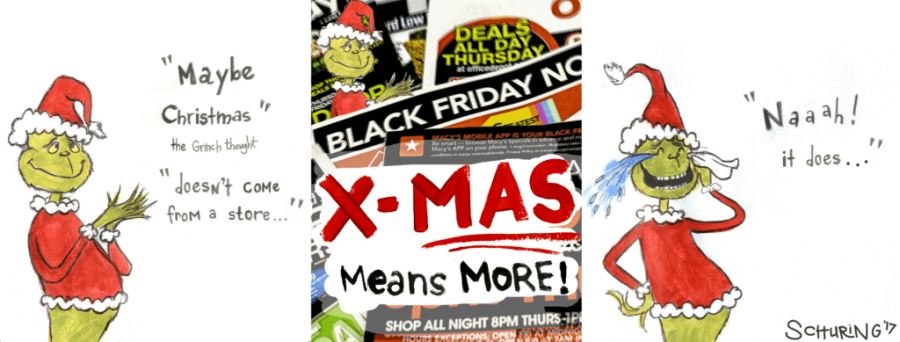Beginning in early fall, signs of holiday cheer appear in stores. At first, it’s only a small section in the middle selling Christmas essentials, but before long they are increasingly pervasive. Before Halloween is over, stores are filled with holiday gear. Christmas displays pop up, catchy slogan-bearing ugly sweaters fill the racks, signs sport colors of red and green and advertisements warn of the coming of the holiday season.
It seems bizarre to begin celebrations of Christmas so early, but stores see a valuable incentive to bust out the holiday spirit as soon as possible: money, and lots of it.
Christmas is a huge generator of revenue, and people are expected to buy a lot to prepare for it. You need festive decorations to light up your home and neighborhood, food for feasts and gifts to shower upon the people you love. The holidays are an expensive time of year, and businesses do all they can to capitalize on the holidays.
Buying has been incorporated as an essential part of the holidays. Companies virtually revise advertising strategies for the holiday season. Starbucks makes special cup designs every year. Makeup companies provide palettes and tutorials geared towards the holidays. Snow, ornaments and pine trees are present in nearly every window display. It’s rare to see a company that doesn’t utilize holiday sentiments in their marketing because they would be missing out on the chance to increase revenue and hold their place in the competitive holiday market. People love the ideals of the holidays, but coziness, family, love and cheer are exploited for the capitalist environment.
One can hardly hear the word Christmas without automatically thinking of gifts. Gift-giving has become one of the core components of Christmas festivities. Giving and receiving gifts is expected among family, friends, neighbors, workmates and loved ones. If you receive a gift from someone, there is an expectation you will give one in return. If you don’t receive a gift from someone, there might be bitterness. If a gift isn’t good enough or expensive enough, then there is a sense of disappointment.
The narrow-mindedness on gift-giving and money-spending takes a toll on what the holidays claim to be about. While the holidays are supposed to be about relaxation, religious observances, time with loved ones, etc., the capitalist pressure to spend sneaks in as an underlying tone for all winter activities.
It is impossible to avoid completely, but there are some ways you can cut down on your spending and increase the true spirit of the holidays. Instead of buying gifts, try making some yourself. The effort you put into a gift will mean more than the amount of money you would spend. Instead of paying for expensive group activities, go volunteer together at a local charity. If you are religious, take time to go to services, gatherings or get to know the people within your community. Visit people you have not seen in a while and catch up with them or reminisce about old times.
Take time to remember what the holiday season means to you. Be conscious of what you really want from the season, whether that is family, religion, happiness or whatever you find valuable.
Happy holidays and a consumerist Christmas to you.


